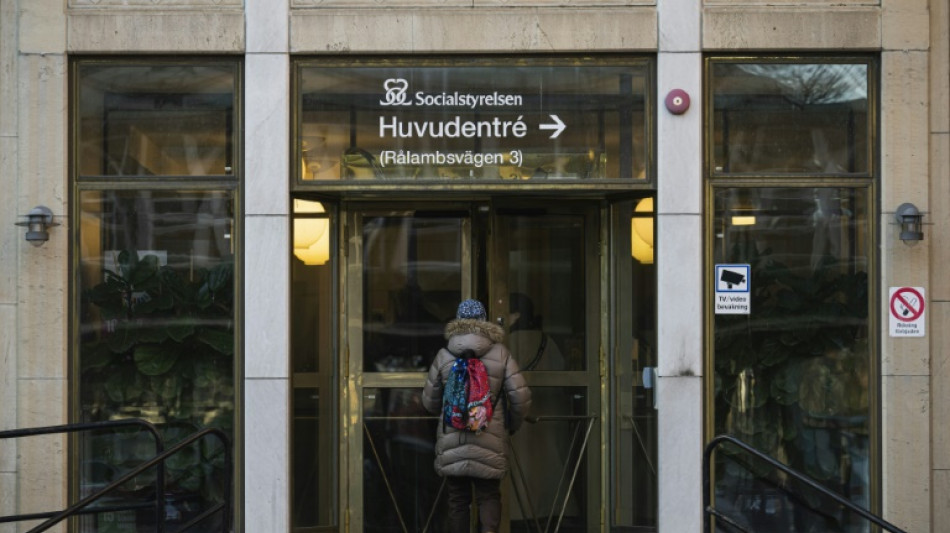
-
 Junta chief frontrunner as Gabon holds first election since 2023 coup
Junta chief frontrunner as Gabon holds first election since 2023 coup
-
Iran delegation in Oman for high-stakes nuclear talks with US
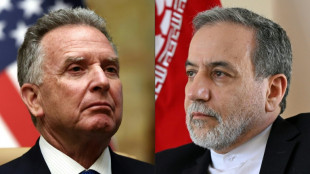
-
 Australia beat Colombia to end BJK Cup bid on winning note
Australia beat Colombia to end BJK Cup bid on winning note
-
German refinery's plight prompts calls for return of Russian oil

-
 Trump carves up world and international order with it
Trump carves up world and international order with it
-
Paris theatre soul-searching after allegations of sexual abuse

-
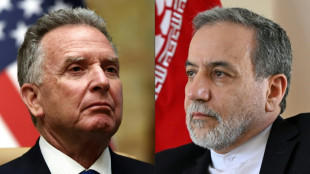 US, Iran to hold high-stakes nuclear talks
US, Iran to hold high-stakes nuclear talks
-
Frustrated families await news days after 222 killed in Dominican club disaster

-
 Jokic triple double as Denver fight back for big win
Jokic triple double as Denver fight back for big win
-
Trump envoy suggests allied zones of control in Ukraine

-
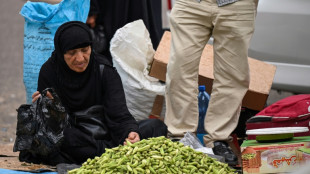 Iraqi markets a haven for pedlars escaping Iran's economic woes
Iraqi markets a haven for pedlars escaping Iran's economic woes
-
Chinese manufacturers in fighting spirits despite scrapped US orders

-
 Argentina receives $42 bn from international financial institutions
Argentina receives $42 bn from international financial institutions
-
Menendez brothers' resentencing can go ahead: LA judge rules

-
 'Hard on the body': Canadian troops train for Arctic defense
'Hard on the body': Canadian troops train for Arctic defense
-
Trump, 78, says feels in 'very good shape' after annual checkup

-
 McKellar 'very, very proud' after 'Tahs tame rampant Chiefs
McKellar 'very, very proud' after 'Tahs tame rampant Chiefs
-
Man executed by firing squad in South Carolina

-
 Defending champ Scheffler three back after tough day at Augusta
Defending champ Scheffler three back after tough day at Augusta
-
Ballester apologizes to Augusta National for relief in Rae's Creek

-
 Scorching Coachella kicks off as Lady Gaga set to helm main stage
Scorching Coachella kicks off as Lady Gaga set to helm main stage
-
McIlroy, DeChambeau charge but Rose clings to Masters lead

-
 Langer misses cut to bring 41st and final Masters appearance to a close
Langer misses cut to bring 41st and final Masters appearance to a close
-
Ecuador presidential hopefuls make last pitch to voters

-
 Rose knocking on the door of a major again at the Masters
Rose knocking on the door of a major again at the Masters
-
DeChambeau finding right balance at Augusta National

-
 Spurs leaker not a player says Postecoglou
Spurs leaker not a player says Postecoglou
-
All Black Barrett helps Leinster into Champions Cup semis

-
 Round-two rebound: Resilient McIlroy right back in the Masters hunt
Round-two rebound: Resilient McIlroy right back in the Masters hunt
-
Asset flight challenges US safe haven status

-
 Menendez brothers appear in LA court for resentencing hearing
Menendez brothers appear in LA court for resentencing hearing
-
McIlroy, DeChambeau charge as Rose clings to Masters lead

-
 UN seeks $275 million in aid for Myanmar quake survivors
UN seeks $275 million in aid for Myanmar quake survivors
-
Frustrated families await news days after 221 killed in Dominican club disaster

-
 Trump wants to halt climate research by key agency: reports
Trump wants to halt climate research by key agency: reports
-
Fed official says 'absolutely' ready to intervene in financial markets

-
 Slumping Homa happy to be headed into weekend at the Masters
Slumping Homa happy to be headed into weekend at the Masters
-
Morbidelli fastest ahead of cagey MotoGP title rivals in Qatar practise

-
 Musetti stuns Monte Carlo Masters champion Tsitsipas to reach semis
Musetti stuns Monte Carlo Masters champion Tsitsipas to reach semis
-
Abuse scandal returns to haunt the flying 'butterflies' of Italian gymnastics

-
 Trump defends policy after China hits US with 125% tariffs
Trump defends policy after China hits US with 125% tariffs
-
Frustrated families await news days after Dominican club disaster

-
 McLarens dominate Bahrain practice, Verstappen rues 'too slow' Red Bull
McLarens dominate Bahrain practice, Verstappen rues 'too slow' Red Bull
-
Eight birdies rescue Masters rookie McCarty after horror start

-
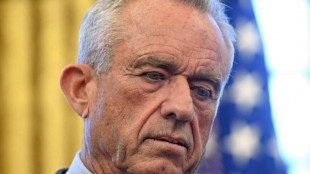 RFK Jr's autism 'epidemic' study raises anti-vaxx fears
RFK Jr's autism 'epidemic' study raises anti-vaxx fears
-
Trump -- oldest elected US president -- undergoes physical

-
 Rose clings to Masters lead as McIlroy, DeChambeau charge
Rose clings to Masters lead as McIlroy, DeChambeau charge
-
Brazil's Bolsonaro hospitalized with abdominal pain, 'stable'

-
 Canada, US to start trade talks in May: Carney
Canada, US to start trade talks in May: Carney
-
Six arrested for murder of notorious Inter Milan ultra


Sweden puts brakes on treatments for trans minors
Sweden, the first country to introduce legal gender reassignment, has begun restricting gender reassignment hormone treatments for minors, as it, like many Western countries, grapples with the highly-sensitive issue.
With the number of diagnoses soaring, the medical community faces the dilemma of weighing precaution against the risks associated with not offering treatment to those suffering from "gender dysphoria".
Sweden decided in February 2022 to halt hormone therapy for minors except in very rare cases, and in December, the National Board of Health and Welfare said mastectomies for teenage girls wanting to transition should be limited to a research setting.
"The uncertain state of knowledge calls for caution," Board department head Thomas Linden said in a statement in December.
So-called puberty blockers have been used in young teens contemplating gender transition to delay the onset of unwanted physical changes.
Like many other countries, Sweden has seen a sharp rise in cases of gender dysphoria, a condition where a person may experience distress as a result of a mismatch between their biological sex and the gender they identify as.
According to the Board of Health and Welfare, approximately 8,900 people were diagnosed with gender dysphoria in Sweden between 1998 and 2021, in a country of around 10 million.
In 2021 alone, about 820 new cases were registered.
The trend is particularly visible among 13- to 17-year-olds born female, with an increase of 1,500 percent since 2008.
"It used to be a male phenomenon and now there is a strong female over-representation," psychiatrist Mikael Landen, chief physician at Sahlgrenska University Hospital in Gothenburg, told AFP.
Landen, who contributed to the scientific study on which the Board of Health based its decision, said the reasons for this increase remain largely a "mystery".
"Tolerance has been high in Sweden for at least the last 25 years, so you can't say it has changed," he said when asked if it was simply a result of a more accepting society.
- Western debate -
The profile of those diagnosed is often complex, according to Linden, as gender dysphoria often occurs in those also suffering from other diagnoses, such as attention deficit and eating disorders or autism.
In May 2021 -- before the Swedish authorities' decision to restrict gender reassignment hormone treatments -- the prestigious Karolinska Hospital in Stockholm chose to restrict such hormone treatments to research projects only.
Other countries are weighing the same questions.
Neighbouring Finland took a similar decision in 2020, while France has called for "the utmost reserve" on hormone treatments for young people.
The UK meanwhile saw a high-profile court case in 2020.
Keira Bell, who regretted her transition from female to male, filed a complaint against the public body responsible for gender dysphoria treatments, claiming she had been too young at age 16 to consent to the treatments.
She ultimately lost her case.
Sweden's recent rollback is all the more notable as it was first in the world to authorise legal gender transition in 1972, paving the way for sex reassignment surgery to be covered by its universal healthcare system.
Rights groups have expressed concern.
Elias Fjellander, president of the youth branch of RFSL, the country's main organisation championing LGBTQ rights, says Sweden's decision risks leading to increased suffering.
"These people might need more care and invasive procedures in the future, because the decision could not be made earlier, even though the medical need was there," he said.
Twenty-year-old Antonia Lindholm, a trans woman who began her transition as a teenager, agreed.
"I think hormones save a lot of people," she told AFP.
"If I were 13 today, I wouldn't have a chance" of getting this treatment, Lindholm added.
- Regret -
But others who have had hormone treatment support the Swedish position.
Mikael Kruse, 36, changed his gender in his late 20s but had a change of heart and finally "detransitioned".
"I think it's good to take a break to understand what's going on," he told AFP.
For seven years, the Swede lived as a woman, but that never resolved his discomfort.
A new diagnosis revealed he had Asperger's Syndrome as well as Attention Deficit Disorder, and the suffering he thought was related to his gender was due to different factors.
"All the pieces of the puzzle fell into place," Kruse said.
For Carolina Jemsby, co-director of the Swedish documentary The Trans Train which brought the care of adolescents into the limelight in 2019, the current debate shows it is "more complex than the healthcare system and society had hoped".
"One aspect of this dilemma is that it has become a political issue," she told AFP.
"It does a disservice to this group who need scientifically proven medical care to help them and give them a better life, and a better ability to live who they are."
In 1972 Sweden introduced an act to allow people to legally change their gender thus becoming, according to the government, "the first country in the world to introduce a formal option in law to be assigned with a new legal gender".
P.Silva--AMWN
